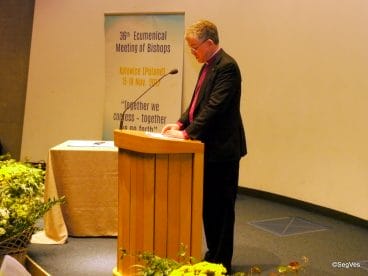
Nov 27, 2017 | Focolare Worldwide
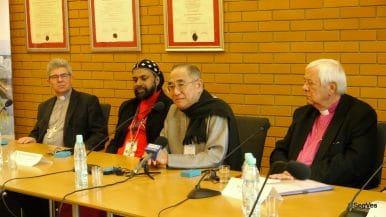 For the first time after 36 years, Poland was the host country of the annual ecumenical convention of the Bishop-friends of the Focolare Movement. After Jerusalem, Istanbul, London, Augsburg and other “symbolic” cities of the ecumenical commitment, Katowice, capital of Slesia, an ancient city of almost 300,000 inhabitant, welcomed, from 15 to 18 November, 35 bishops of different Churches: Orthodox, Syriac-Orthodox, Evangelical-Lutherans, Anglican, Methodists and Catholics from Germany, Austria, England, Ireland, Sweden, Poland, Hungary, Lithuania, Latvia, Czech Republic, but also Brazil, Cyprus, India, Democratic Republic of Congo, Thailand and the USA. Along with around thirty lay people the bishops gathered in Katowice represented a cross section of various social and ecclesial communities, driven by the desire to make an experience of fraternal communion. “Together we confess, together we go forth” was the title of the Convention, which was organized not only by the Focolare Movement, but also by the local Catholic Archdiocese and the Evangelical-Lutheran Church of Augustinian Confession, the Orthodox Church of Sosnowiec, the Faculty of Theology of the Slesia University and the city of Katowice itself, represented by mayor Marcin Krupa.
For the first time after 36 years, Poland was the host country of the annual ecumenical convention of the Bishop-friends of the Focolare Movement. After Jerusalem, Istanbul, London, Augsburg and other “symbolic” cities of the ecumenical commitment, Katowice, capital of Slesia, an ancient city of almost 300,000 inhabitant, welcomed, from 15 to 18 November, 35 bishops of different Churches: Orthodox, Syriac-Orthodox, Evangelical-Lutherans, Anglican, Methodists and Catholics from Germany, Austria, England, Ireland, Sweden, Poland, Hungary, Lithuania, Latvia, Czech Republic, but also Brazil, Cyprus, India, Democratic Republic of Congo, Thailand and the USA. Along with around thirty lay people the bishops gathered in Katowice represented a cross section of various social and ecclesial communities, driven by the desire to make an experience of fraternal communion. “Together we confess, together we go forth” was the title of the Convention, which was organized not only by the Focolare Movement, but also by the local Catholic Archdiocese and the Evangelical-Lutheran Church of Augustinian Confession, the Orthodox Church of Sosnowiec, the Faculty of Theology of the Slesia University and the city of Katowice itself, represented by mayor Marcin Krupa. 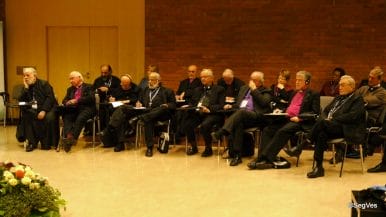 The convention opened with the reflection of Lesley Ellison, an Anglican, on “The Spirituality of unity: an ecumenical spirituality,” and had as its central theme “Mary, the Mother of Jesus,” with the theological studies in the various Catholic, Evangelic, Anglican and Orthodox perspectives. There were many encounters, celebrations and moments of prayer according to the various traditions, sealed by a “pact of mutual love” to live fraternal communion and to “love the Church of the other as one’s own Brendan Leahly is the Catholic bishop of Limerick (Irelanda), expert and counselor of ecumenical dialogue in his country. Interviewed on the phone, he said: “I want to underline the warm welcome received in Katowice, which I had already visited in 1991, on the occasion of Chiara Lubich’s encounter with the Focolare centers of Western and Eastern Europe. It is a highly developed city, which valorizes diversity and hospitality. Just as what we experienced in these days, the hospitality of the Faculty of Theology which hosted us, but also of the Catholic, Lutheran and Orthodox Churches.” The convention was the occasion to get to know one another better, and acquire a deeper knowledge of the different ecclesial and socio-cultural realities we live in, especially in the Middle East and Eastern Europe. We realize that we cannot offer solutions for the problems of those countries (especially regarding the Middle East), but we can at least carry one another’s burdens. Feeling the suffering of others has enlarged my heart. Now I no longer feel only like an Irish bishop, I carry within also the situations and problems of the other bishops. But with a new hope. In every country there are signs of hope, and the steps taken at ecumenical level go to prove this fact. For example in the Czech Republic a process of mutual forgiveness is underway for the errors committed. Ecumenism – he continued– is a reality that started its path many years ago, and will meet ever new situations and give new testimonials. It is, after all, an experience of giving and receiving. What strikes me is the strong Catholic faith which is deeply rooted here in Poland, but also the openness to dialogue with the representatives of the other communities.”
The convention opened with the reflection of Lesley Ellison, an Anglican, on “The Spirituality of unity: an ecumenical spirituality,” and had as its central theme “Mary, the Mother of Jesus,” with the theological studies in the various Catholic, Evangelic, Anglican and Orthodox perspectives. There were many encounters, celebrations and moments of prayer according to the various traditions, sealed by a “pact of mutual love” to live fraternal communion and to “love the Church of the other as one’s own Brendan Leahly is the Catholic bishop of Limerick (Irelanda), expert and counselor of ecumenical dialogue in his country. Interviewed on the phone, he said: “I want to underline the warm welcome received in Katowice, which I had already visited in 1991, on the occasion of Chiara Lubich’s encounter with the Focolare centers of Western and Eastern Europe. It is a highly developed city, which valorizes diversity and hospitality. Just as what we experienced in these days, the hospitality of the Faculty of Theology which hosted us, but also of the Catholic, Lutheran and Orthodox Churches.” The convention was the occasion to get to know one another better, and acquire a deeper knowledge of the different ecclesial and socio-cultural realities we live in, especially in the Middle East and Eastern Europe. We realize that we cannot offer solutions for the problems of those countries (especially regarding the Middle East), but we can at least carry one another’s burdens. Feeling the suffering of others has enlarged my heart. Now I no longer feel only like an Irish bishop, I carry within also the situations and problems of the other bishops. But with a new hope. In every country there are signs of hope, and the steps taken at ecumenical level go to prove this fact. For example in the Czech Republic a process of mutual forgiveness is underway for the errors committed. Ecumenism – he continued– is a reality that started its path many years ago, and will meet ever new situations and give new testimonials. It is, after all, an experience of giving and receiving. What strikes me is the strong Catholic faith which is deeply rooted here in Poland, but also the openness to dialogue with the representatives of the other communities.”  Åke Bonnier, Lutheran bishop of the diocese of Skara, in Sweden, said he was happy about the convention: «We were not bishops but brothers. What we shared in the convention was a reality, both during the breaks and intervals, and also during the celebrations. This was very important for me, it gave me new strength and enthusiasm. I now look forward to next year, when, I hope all of them and also others can come to Sweden. If they ask me if this meeting was important as a path for the unity of Christians, my answer is yes. Unity is not something that will come about only in the future, it is already a reality among us.”
Åke Bonnier, Lutheran bishop of the diocese of Skara, in Sweden, said he was happy about the convention: «We were not bishops but brothers. What we shared in the convention was a reality, both during the breaks and intervals, and also during the celebrations. This was very important for me, it gave me new strength and enthusiasm. I now look forward to next year, when, I hope all of them and also others can come to Sweden. If they ask me if this meeting was important as a path for the unity of Christians, my answer is yes. Unity is not something that will come about only in the future, it is already a reality among us.”

Nov 23, 2017 | Focolare Worldwide
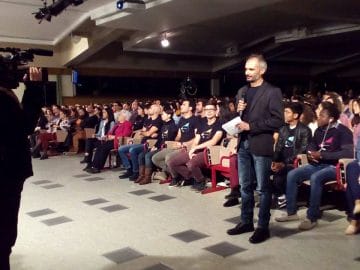
Paolo Balduzzi, TV journalist, presents the “Youth for a united World” during the live worldwide transmission.
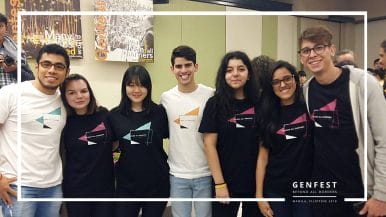 It’s that great idea that was launched by Chiara Lubich in 1987, the idea she bequeathed to the new generations. That year, the Focolare foundress stood in front of a vast crowd of young people and explained to them the reason for the Genfest: “An explosion of fires, not artificial fireworks, but real fires, the fire of God’s love. The goal of ut omnes (“Father, may they all be one” [Jn 17:20-23]) draws near. Jesus wins over and draws people along, leaving behind everything that doesn’t move, like a stream of fresh water that leaves to the sides all the things that can’t be carried ahead in its limpid waters.” Chiara added: “You’ll see the miracles of God’s grace, because God is with us, God is in our midst. He’s the only Powerful One.” Standing among the young people was the current president of the Focolare, Maria Voce. “I’d like to say a huge thank you to the young people.” They’ve made a great act of courage “which seems like the answer of today to the appeal Chiara has launched ever since 1960: ‘Young people of the world unite!’ This appeal still resounds right now, not only for you, but for everyone. The goal of a united world has not yet been reached. The first generation couldn’t do it alone. The second won’t do it alone either, because its purpose is so vast. The idea of a united world has to be passed on from one generation to the next, and all of them united together can hope to bring it to fulfilment.”
It’s that great idea that was launched by Chiara Lubich in 1987, the idea she bequeathed to the new generations. That year, the Focolare foundress stood in front of a vast crowd of young people and explained to them the reason for the Genfest: “An explosion of fires, not artificial fireworks, but real fires, the fire of God’s love. The goal of ut omnes (“Father, may they all be one” [Jn 17:20-23]) draws near. Jesus wins over and draws people along, leaving behind everything that doesn’t move, like a stream of fresh water that leaves to the sides all the things that can’t be carried ahead in its limpid waters.” Chiara added: “You’ll see the miracles of God’s grace, because God is with us, God is in our midst. He’s the only Powerful One.” Standing among the young people was the current president of the Focolare, Maria Voce. “I’d like to say a huge thank you to the young people.” They’ve made a great act of courage “which seems like the answer of today to the appeal Chiara has launched ever since 1960: ‘Young people of the world unite!’ This appeal still resounds right now, not only for you, but for everyone. The goal of a united world has not yet been reached. The first generation couldn’t do it alone. The second won’t do it alone either, because its purpose is so vast. The idea of a united world has to be passed on from one generation to the next, and all of them united together can hope to bring it to fulfilment.”  She went on to say: “The Genfest isn’t something that only regards the young, but everyone. That’s why I want to go, and I hope there will be many of us.” Everyone can do something. “Some may say: but I’m sick, I can’t… Offer your pain! Let’s all of us step up. You can help by offering hospitality; you can help the young people to prepare their programmes; you can give financial support for the young people who otherwise wouldn’t be able to attend. Let’s do all we can, whatever it takes. The Genfest is mine, it’s ours!” Before signing off, young person from the Philippines leaves everyone with a triple task: “First: organize a local Genfest. Second: do a concrete project to help at least one young person go to Manila. Third: Buy the T-shirt with our logo.” Find all the details at: Youth for a United World website, and remember this acronym Y4UW. See also: dev.focolare.org/en/genfest-2018/
She went on to say: “The Genfest isn’t something that only regards the young, but everyone. That’s why I want to go, and I hope there will be many of us.” Everyone can do something. “Some may say: but I’m sick, I can’t… Offer your pain! Let’s all of us step up. You can help by offering hospitality; you can help the young people to prepare their programmes; you can give financial support for the young people who otherwise wouldn’t be able to attend. Let’s do all we can, whatever it takes. The Genfest is mine, it’s ours!” Before signing off, young person from the Philippines leaves everyone with a triple task: “First: organize a local Genfest. Second: do a concrete project to help at least one young person go to Manila. Third: Buy the T-shirt with our logo.” Find all the details at: Youth for a United World website, and remember this acronym Y4UW. See also: dev.focolare.org/en/genfest-2018/
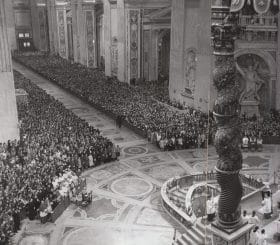
Nov 20, 2017 | Focolare Worldwide

Patrizia Mazzola
 y background was in the Scouts, so I couldn’t believe that I could take part in this new experience. The invitation was extended to many other students at my school, and finally, together with my sisters, we made up our minds to attend, even though I remember that at the last minute I was tempted to stay back as I had to undertake an exam. The others encouraged me to go and so we left Palermo on a number of buses. With me I took my inseparable guitar, songbooks and tape-recorder, which at that time was rather cumbersome. During the trip, I was favourably impressed by some of the girls, the Gen, who were already living the spirituality of unity. I was struck by their attitude, the attention they were giving to everyone, the climate of harmony and serenity that they created among us, despite our exuberance, the moments of reflection that followed when we listened to the songs of Gen Rosso and Gen Verde, which I learnt to play straightaway with great enthusiasm
y background was in the Scouts, so I couldn’t believe that I could take part in this new experience. The invitation was extended to many other students at my school, and finally, together with my sisters, we made up our minds to attend, even though I remember that at the last minute I was tempted to stay back as I had to undertake an exam. The others encouraged me to go and so we left Palermo on a number of buses. With me I took my inseparable guitar, songbooks and tape-recorder, which at that time was rather cumbersome. During the trip, I was favourably impressed by some of the girls, the Gen, who were already living the spirituality of unity. I was struck by their attitude, the attention they were giving to everyone, the climate of harmony and serenity that they created among us, despite our exuberance, the moments of reflection that followed when we listened to the songs of Gen Rosso and Gen Verde, which I learnt to play straightaway with great enthusiasm  It was March 1st, 1975. The Sports Palace in Rome which had gathered 20,000 young people from five continents, made a powerful impact on me. I immediately experienced the power of the Gospel when it is lived. For example, it was the first time that I found myself sharing deeply with someone who was sitting next to me, thus having the experience of living as brothers and sisters. My dream, to see a world of peace, a united world, came true, right there. I was amazed and awestruck by the personal testimonies so much so that I almost had to pinch myself to believe that all this was happening. I listened attentively as they shared their stories from the stage: the two young people from South Africa where apartheid had not yet been defeated, the group from Belfast where there was conflict due to religious and political division. They were tangible signs that, if we really commit ourselves, we can achieve peace there where we live.
It was March 1st, 1975. The Sports Palace in Rome which had gathered 20,000 young people from five continents, made a powerful impact on me. I immediately experienced the power of the Gospel when it is lived. For example, it was the first time that I found myself sharing deeply with someone who was sitting next to me, thus having the experience of living as brothers and sisters. My dream, to see a world of peace, a united world, came true, right there. I was amazed and awestruck by the personal testimonies so much so that I almost had to pinch myself to believe that all this was happening. I listened attentively as they shared their stories from the stage: the two young people from South Africa where apartheid had not yet been defeated, the group from Belfast where there was conflict due to religious and political division. They were tangible signs that, if we really commit ourselves, we can achieve peace there where we live.
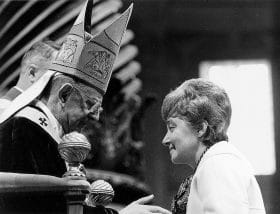 The next day, we all gathered at the Vatican, in St Peter’s Basilica, where Chiara Lubich presented us to the Holy Father. During the offertory, twelve young people, representing us, walked up with Chiara on the altar. I remember there was an endless applause. Consequently, during the Angelus (midday prayer) in St Peter’s Square, the Pope greeted us with words encouraging us to go on: “This morning, around the altar, we had twenty thousand faithful, the young Gen – New Generation – who came from all over the world. The beauty of it was something moving. We thank God and take courage. A new world is born: the Christian world of faith and charity.”
The next day, we all gathered at the Vatican, in St Peter’s Basilica, where Chiara Lubich presented us to the Holy Father. During the offertory, twelve young people, representing us, walked up with Chiara on the altar. I remember there was an endless applause. Consequently, during the Angelus (midday prayer) in St Peter’s Square, the Pope greeted us with words encouraging us to go on: “This morning, around the altar, we had twenty thousand faithful, the young Gen – New Generation – who came from all over the world. The beauty of it was something moving. We thank God and take courage. A new world is born: the Christian world of faith and charity.”
It was truly the beginning of a new world. For me it marked the beginning of a new life.
Patrizia Mazzola

Nov 16, 2017 | Focolare Worldwide
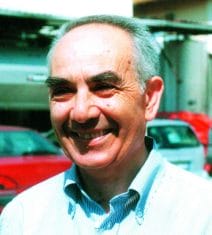 Domenico Mangano (1938-2001) answered God’s call “with readiness, loyalty, continuity, but above all, with an absolute freedom of conscience. He freely chose social commitment, which refined itself into a political commitment. When he met the Focolare Movement, he tried daily to improve his spiritual life by choosing to live “the holy journey” in unity with others. This experience rooted itself deeply in this active and resourceful citizen, committed and combative layman, fiery and pungent politician, true and faithful Christian, that was Domenico”. These words were said by the Hon.Tommaso Sorgi on the death of his “dear friend, a discreet and wise confidant, who was more than a brother”. For many years, Sorgi shared with him “the same yearning to unite heaven and earth and the same ardent passion to convey the provocative gospel message in a tough political situation. Above all, we lived together the birth of the Movement for Unity in Politics, that type of political experience which aims at building universal brotherhood and which was launched in parliament by Igino Giordani, a model for both of us”
Domenico Mangano (1938-2001) answered God’s call “with readiness, loyalty, continuity, but above all, with an absolute freedom of conscience. He freely chose social commitment, which refined itself into a political commitment. When he met the Focolare Movement, he tried daily to improve his spiritual life by choosing to live “the holy journey” in unity with others. This experience rooted itself deeply in this active and resourceful citizen, committed and combative layman, fiery and pungent politician, true and faithful Christian, that was Domenico”. These words were said by the Hon.Tommaso Sorgi on the death of his “dear friend, a discreet and wise confidant, who was more than a brother”. For many years, Sorgi shared with him “the same yearning to unite heaven and earth and the same ardent passion to convey the provocative gospel message in a tough political situation. Above all, we lived together the birth of the Movement for Unity in Politics, that type of political experience which aims at building universal brotherhood and which was launched in parliament by Igino Giordani, a model for both of us” 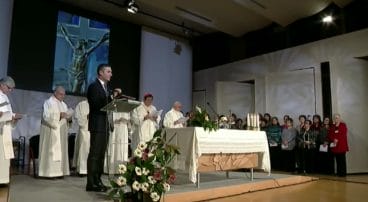 Domenico Mangano was born on February 22,1938 in Anzi, in the province of Potenza. In 1949 his family moved to Viterbo. In 1958, after finishing his high school studies, he managed to succeed in getting a job at the National Institute of Social Security in Pavia. He went to live there, and enrolled as a student-worker at the Faculty of Economics and Commerce. He met Maria Pia when he went back to Viterbo and they got married on August 24, 1966. They had three children: Paola (1968), Giuseppe (1970) and Maria Flora (1972). During these years, Domenico was fully committed to family life, work, university students, trade union, Catholic Action and studies. They were years in which he started his political activity as a public administrator in Viterbo. Domenico met the Focolare Movement in 1974 and together with Maria Pia adhered to its ideals. He was a Volunteer of God, a member of that branch of the Movement where lay people are radically committed to bring the light, that springs from Chiara Lubich’s charism, to all aspects of social life. He was determined “to walk in God‘s way” as indicated by Lubich, and he frequently wrote to her. Lubich remarked that he was a mystic.
Domenico Mangano was born on February 22,1938 in Anzi, in the province of Potenza. In 1949 his family moved to Viterbo. In 1958, after finishing his high school studies, he managed to succeed in getting a job at the National Institute of Social Security in Pavia. He went to live there, and enrolled as a student-worker at the Faculty of Economics and Commerce. He met Maria Pia when he went back to Viterbo and they got married on August 24, 1966. They had three children: Paola (1968), Giuseppe (1970) and Maria Flora (1972). During these years, Domenico was fully committed to family life, work, university students, trade union, Catholic Action and studies. They were years in which he started his political activity as a public administrator in Viterbo. Domenico met the Focolare Movement in 1974 and together with Maria Pia adhered to its ideals. He was a Volunteer of God, a member of that branch of the Movement where lay people are radically committed to bring the light, that springs from Chiara Lubich’s charism, to all aspects of social life. He was determined “to walk in God‘s way” as indicated by Lubich, and he frequently wrote to her. Lubich remarked that he was a mystic.  Domenico died at Viterbo on December 22, 2001. The year before when he was diagnosed with an incurable tumour, he knew it was time “to end the first long chapter of life by entrusting it to God’s merciful heart, and open another one that is completely new”. This was what he wrote to Chiara to share his situation. With the official Edict dated March 9, 2017, Mons. Marcello Semeraro, Bishop of Albano accepted the petition to allow the initialization of the Cause for the Beatification and Canonization of Domenico Mangano, presented by the postulator Waldery Hilgeman, and invited the ecclesial community to pronounce itself on the fame of holiness and signs of the new Servant of God. See also: Domenico Mangano
Domenico died at Viterbo on December 22, 2001. The year before when he was diagnosed with an incurable tumour, he knew it was time “to end the first long chapter of life by entrusting it to God’s merciful heart, and open another one that is completely new”. This was what he wrote to Chiara to share his situation. With the official Edict dated March 9, 2017, Mons. Marcello Semeraro, Bishop of Albano accepted the petition to allow the initialization of the Cause for the Beatification and Canonization of Domenico Mangano, presented by the postulator Waldery Hilgeman, and invited the ecclesial community to pronounce itself on the fame of holiness and signs of the new Servant of God. See also: Domenico Mangano
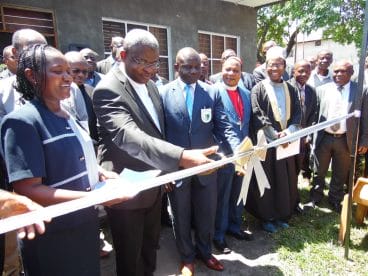
Nov 14, 2017 | Focolare Worldwide
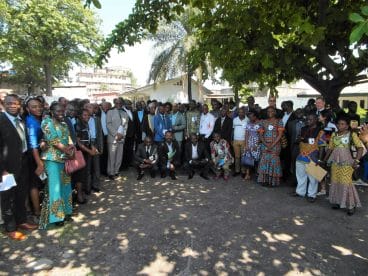 The political and social context is very dangerous and the per capita income is among the lowest in the world as pressure from international powers is being placed on the enormous natural resources of the region. But there is also the echo of the great African leaders from the twentieth century, from Nkruah to Senghor, from Lumumba to Nyerere that still resonates like a warning to leave the past behind and set great goals that “always seem impossible until done” (Mandela). It was in that context that on November 4th of last year the Ecoforleaders School of Higher Training in Communion Leadership was inaugurated in Kinshasa, Democratic Republic of the Congo in the presence of several political, diplomatic, academic ((among whom the Rectors of the Catholic University and the University of Mapon, and the two Emeritus Rectors of the Kasangani University and the National Pedagogy), Christian and Muslim religious leaders in an attempt to lift up a hope for openness in that African country. It all began with a group of African students who wondered how they could offer themselves for the building of a new Africa. Now they are working with the support of Sophia University Institute and the Focolare’s International Centre of the Movement for Unity in Politics.
The political and social context is very dangerous and the per capita income is among the lowest in the world as pressure from international powers is being placed on the enormous natural resources of the region. But there is also the echo of the great African leaders from the twentieth century, from Nkruah to Senghor, from Lumumba to Nyerere that still resonates like a warning to leave the past behind and set great goals that “always seem impossible until done” (Mandela). It was in that context that on November 4th of last year the Ecoforleaders School of Higher Training in Communion Leadership was inaugurated in Kinshasa, Democratic Republic of the Congo in the presence of several political, diplomatic, academic ((among whom the Rectors of the Catholic University and the University of Mapon, and the two Emeritus Rectors of the Kasangani University and the National Pedagogy), Christian and Muslim religious leaders in an attempt to lift up a hope for openness in that African country. It all began with a group of African students who wondered how they could offer themselves for the building of a new Africa. Now they are working with the support of Sophia University Institute and the Focolare’s International Centre of the Movement for Unity in Politics.  The Secretary of the Bishops Conference of the Democratic Republic of the Congo was invited to cut the ribbon, a man know for having conducted the dialogue between politicians of the majority and opposition leaders during the election controversy that linked the presidential election date to the next census. The Secretary remains a point of encounter between the parties until this day. Five students will begin courses given by a faculty that includes three university rectors and several tutors. This is not an isolated initiative, because the School is inserted into a broader project already presented at UNESCO, a project of formation in a leadership style inspired by universal brotherhood, which include the training of tutors and professors in Nairobi next January. The project is of interest to the whole East of Africa and will last for three years. Afterwards, it will be expanded to other regions of the continent. See also: News Repubblica Democratica del Congo
The Secretary of the Bishops Conference of the Democratic Republic of the Congo was invited to cut the ribbon, a man know for having conducted the dialogue between politicians of the majority and opposition leaders during the election controversy that linked the presidential election date to the next census. The Secretary remains a point of encounter between the parties until this day. Five students will begin courses given by a faculty that includes three university rectors and several tutors. This is not an isolated initiative, because the School is inserted into a broader project already presented at UNESCO, a project of formation in a leadership style inspired by universal brotherhood, which include the training of tutors and professors in Nairobi next January. The project is of interest to the whole East of Africa and will last for three years. Afterwards, it will be expanded to other regions of the continent. See also: News Repubblica Democratica del Congo

 For the first time after 36 years, Poland was the host country of the annual ecumenical convention of the Bishop-friends of the Focolare Movement. After Jerusalem, Istanbul, London, Augsburg and other “symbolic” cities of the ecumenical commitment, Katowice, capital of Slesia, an ancient city of almost 300,000 inhabitant, welcomed, from 15 to 18 November, 35 bishops of different Churches: Orthodox, Syriac-Orthodox, Evangelical-Lutherans, Anglican, Methodists and Catholics from Germany, Austria, England, Ireland, Sweden, Poland, Hungary, Lithuania, Latvia, Czech Republic, but also Brazil, Cyprus, India, Democratic Republic of Congo, Thailand and the USA. Along with around thirty lay people the bishops gathered in Katowice represented a cross section of various social and ecclesial communities, driven by the desire to make an experience of fraternal communion. “Together we confess, together we go forth” was the title of the Convention, which was organized not only by the Focolare Movement, but also by the local Catholic Archdiocese and the Evangelical-Lutheran Church of Augustinian Confession, the Orthodox Church of Sosnowiec, the Faculty of Theology of the Slesia University and the city of Katowice itself, represented by mayor Marcin Krupa.
For the first time after 36 years, Poland was the host country of the annual ecumenical convention of the Bishop-friends of the Focolare Movement. After Jerusalem, Istanbul, London, Augsburg and other “symbolic” cities of the ecumenical commitment, Katowice, capital of Slesia, an ancient city of almost 300,000 inhabitant, welcomed, from 15 to 18 November, 35 bishops of different Churches: Orthodox, Syriac-Orthodox, Evangelical-Lutherans, Anglican, Methodists and Catholics from Germany, Austria, England, Ireland, Sweden, Poland, Hungary, Lithuania, Latvia, Czech Republic, but also Brazil, Cyprus, India, Democratic Republic of Congo, Thailand and the USA. Along with around thirty lay people the bishops gathered in Katowice represented a cross section of various social and ecclesial communities, driven by the desire to make an experience of fraternal communion. “Together we confess, together we go forth” was the title of the Convention, which was organized not only by the Focolare Movement, but also by the local Catholic Archdiocese and the Evangelical-Lutheran Church of Augustinian Confession, the Orthodox Church of Sosnowiec, the Faculty of Theology of the Slesia University and the city of Katowice itself, represented by mayor Marcin Krupa.  The convention opened with the reflection of Lesley Ellison, an Anglican, on “The Spirituality of unity: an ecumenical spirituality,” and had as its central theme “Mary, the Mother of Jesus,” with the theological studies in the various Catholic, Evangelic, Anglican and Orthodox perspectives. There were many encounters, celebrations and moments of prayer according to the various traditions, sealed by a “pact of mutual love” to live fraternal communion and to “love the Church of the other as one’s own Brendan Leahly is the Catholic bishop of Limerick (Irelanda), expert and counselor of ecumenical dialogue in his country. Interviewed on the phone, he said: “I want to underline the warm welcome received in Katowice, which I had already visited in 1991, on the occasion of Chiara Lubich’s encounter with the Focolare centers of Western and Eastern Europe. It is a highly developed city, which valorizes diversity and hospitality. Just as what we experienced in these days, the hospitality of the Faculty of Theology which hosted us, but also of the Catholic, Lutheran and Orthodox Churches.” The convention was the occasion to get to know one another better, and acquire a deeper knowledge of the different ecclesial and socio-cultural realities we live in, especially in the Middle East and Eastern Europe. We realize that we cannot offer solutions for the problems of those countries (especially regarding the Middle East), but we can at least carry one another’s burdens. Feeling the suffering of others has enlarged my heart. Now I no longer feel only like an Irish bishop, I carry within also the situations and problems of the other bishops. But with a new hope. In every country there are signs of hope, and the steps taken at ecumenical level go to prove this fact. For example in the Czech Republic a process of mutual forgiveness is underway for the errors committed. Ecumenism – he continued– is a reality that started its path many years ago, and will meet ever new situations and give new testimonials. It is, after all, an experience of giving and receiving. What strikes me is the strong Catholic faith which is deeply rooted here in Poland, but also the openness to dialogue with the representatives of the other communities.”
The convention opened with the reflection of Lesley Ellison, an Anglican, on “The Spirituality of unity: an ecumenical spirituality,” and had as its central theme “Mary, the Mother of Jesus,” with the theological studies in the various Catholic, Evangelic, Anglican and Orthodox perspectives. There were many encounters, celebrations and moments of prayer according to the various traditions, sealed by a “pact of mutual love” to live fraternal communion and to “love the Church of the other as one’s own Brendan Leahly is the Catholic bishop of Limerick (Irelanda), expert and counselor of ecumenical dialogue in his country. Interviewed on the phone, he said: “I want to underline the warm welcome received in Katowice, which I had already visited in 1991, on the occasion of Chiara Lubich’s encounter with the Focolare centers of Western and Eastern Europe. It is a highly developed city, which valorizes diversity and hospitality. Just as what we experienced in these days, the hospitality of the Faculty of Theology which hosted us, but also of the Catholic, Lutheran and Orthodox Churches.” The convention was the occasion to get to know one another better, and acquire a deeper knowledge of the different ecclesial and socio-cultural realities we live in, especially in the Middle East and Eastern Europe. We realize that we cannot offer solutions for the problems of those countries (especially regarding the Middle East), but we can at least carry one another’s burdens. Feeling the suffering of others has enlarged my heart. Now I no longer feel only like an Irish bishop, I carry within also the situations and problems of the other bishops. But with a new hope. In every country there are signs of hope, and the steps taken at ecumenical level go to prove this fact. For example in the Czech Republic a process of mutual forgiveness is underway for the errors committed. Ecumenism – he continued– is a reality that started its path many years ago, and will meet ever new situations and give new testimonials. It is, after all, an experience of giving and receiving. What strikes me is the strong Catholic faith which is deeply rooted here in Poland, but also the openness to dialogue with the representatives of the other communities.”  Åke Bonnier, Lutheran bishop of the diocese of Skara, in Sweden, said he was happy about the convention: «We were not bishops but brothers. What we shared in the convention was a reality, both during the breaks and intervals, and also during the celebrations. This was very important for me, it gave me new strength and enthusiasm. I now look forward to next year, when, I hope all of them and also others can come to Sweden. If they ask me if this meeting was important as a path for the unity of Christians, my answer is yes. Unity is not something that will come about only in the future, it is already a reality among us.”
Åke Bonnier, Lutheran bishop of the diocese of Skara, in Sweden, said he was happy about the convention: «We were not bishops but brothers. What we shared in the convention was a reality, both during the breaks and intervals, and also during the celebrations. This was very important for me, it gave me new strength and enthusiasm. I now look forward to next year, when, I hope all of them and also others can come to Sweden. If they ask me if this meeting was important as a path for the unity of Christians, my answer is yes. Unity is not something that will come about only in the future, it is already a reality among us.” 











